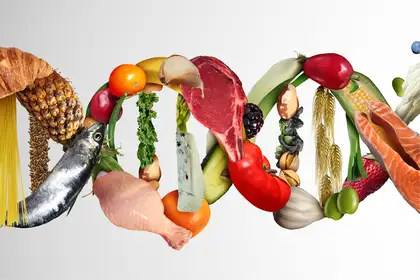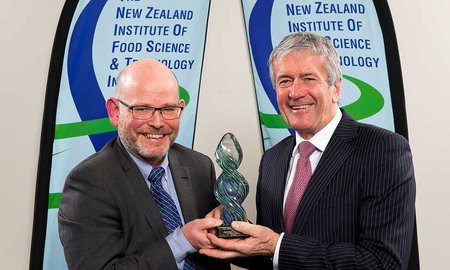
In a new review, authors from the Quadram Institute, the University of East Anglia, the Royal Veterinary College and Te Kunenga ki Pūrehuroa Massey University are calling for more holistic approaches that assess the risks and monitor changes in these microbial communities as a whole and across the food chain.
Distinguished Professor Nigel French from the School of Veterinary Science is the Massey author involved in the publication.
Foodborne illness affected one in 10 people globally in 2010, causing over 400,000 deaths. Bacteria have a substantial contribution to this burden. We’ve known for decades what some of the most dangerous bacterial species are and the potentially devastating effects they can have on health, but what has been less well understood is how and where these bacteria get into, persist and evolve in an increasingly globalised food system, nor what other bacterial pathogens are causing disease but for which we haven’t had the tools to detect.
Not only do these knowledge gaps make it difficult to develop interventions that will reduce foodborne illness, but that there is an increasing challenge to understand how massive global drivers, such as climate change, technology innovation, or other geopolitical events can alter the profile of bacteria within the food system. We have good information on how economies and environments shift due to global pressures, but less so on how microbial ecologies likewise shift. How do these change the enduring hazards we’re aware of? And how will these lead to new, emerging hazards?
This is partly due to an historic tendency to focus on individual bacterial species known to pose risks to health. But bacteria live more complex lives; they exist in interacting communities of microbes, which can rapidly evolve to exploit new ecological niches.
Whole genome sequencing and metagenomics provide the tools to sequence the genomes of every organism in a sample. Metagenomics gives a full picture of what’s present in a particular environment, and through sequencing the whole genome of a bacterium, you can identify the genetic elements that give those microbes the edge to exploit a particular niche, such as tolerance of antimicrobials.
That genetic fingerprinting can also help identify the sources of outbreaks, linking genetically identical strains of bacteria that might be indistinguishable otherwise. It can also be used to trace back when and how particularly problematic bacterial strains emerged – something that becomes increasingly challenging but ever more important as global food chains become more complex.
For example, whole genome sequencing tracked the ‘microevolution’ of the most prevalent Salmonella Typhimurium strain globally. This strain not only acquired antimicrobial resistance genes but also genes conferring tolerance to heavy metals, most probably through exposure to zinc and copper used as supplements in pig feed. It has also picked up viral genes that aid its invasion of host cells, all of which turned this strain from the cause of an emerging epidemic in animals to an enduring threat that’s spread across the world.
The prevention and control of Campylobacter, another globally important foodborne pathogen, has also benefited from the application of genome sequencing tools. These tools have provided powerful approaches to tracking and tracing the transmission of this bacteria through the food chain, as well as identifying and determining the source of outbreaks.
This is why researchers want to see genomic surveillance adopted much more widely, across the world, so we can help keep ahead of the microbial threats as they emerge.
“What will be key to these surveillance systems is not only sensitivity, but also timeliness, so that pre-emptive action to prevent foodborne illness can be taken rather than using the information to respond to incidents once they have occurred,” Professor Alison Mather from the Quadram Institute says.
The call goes out to governments and international agencies to dedicate resources to genome-based surveillance, so that its benefits can be felt equitably. Currently, most genomic surveillance is based in well resourced areas. But these are truly global problems and if we are to make our food supply chain resilient to future shocks, it needs a truly global response.
The economic and social benefits of global genomic surveillance of the food system are there for us all. As we get more and more genomic and metagenomic data, from a wider and more diverse set of sources, the better surveillance can pick up threats. Accordingly, the review summarises perspectives shared by food producers and other food businesses as they begin their own pursuits of using genomic technologies to help safeguard consumers.
Informed by prioritisation exercises and proof-of-concept research projects, including those in the UK’s Food Safety Research Network, the Quadram Institute's Dr Matthew Gilmour says, “Businesses understand there is a great depth of information that can be provided by genomics, and thankfully, we can pair that technological promise with meaningful new solutions to help control food safety risks.”
Scientists, governments and businesses are now building a 21st century system to better prevent, detect and respond to the microbial threats that travel the world on our food. To enable the adoption of genomic-based systems, the costs of the technology that underpins genomics are dropping, the community working in this area is dedicated to equitable data-sharing and through knowledge exchange, and access to training genomics at this level is becoming more and more accessible.
The article is available here.
Related news
Distinguished Professor appointed co-director of Infectious Diseases Research Platform
Distinguished Professor Nigel French has been appointed inaugural co-director of the Infectious Diseases Research Platform, alongside Hauora Māori leader Te Pora Thompson.

Massey professor advising the Ministry of Health in fight against COVID-19
Helping to identify where and how mystery cases of COVID-19 have been caught in the community has been a focus for epidemiologist Professor Nigel French who is a member of the Ministry of Health's COVID-19 technical advisory group.

Professor Nigel French recognised for food safety impact
Massey University Distinguished Professor Nigel French has received the Ministry for Primary Industries Award for Significant Contribution to Food Safety.
